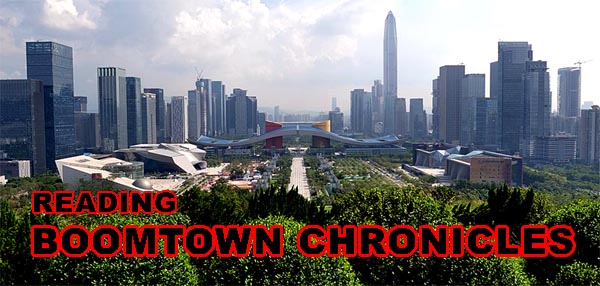 |
| Shenzhen, the Boomtown (Wikipedia) |
Note: Between Lesson #01-128 and #01-207, I wrote 72 lessons explaining expressions in articles published in the Shenzhen Daily. Read more about "Reading Boomtown Chronicles."
Get Ready: Have you ever visited (or lived in) a boomtown? What was it like?
In mid-2008, the Shenzhen Daily began publishing a truly excellent series on Shenzhen's history called "Boomtown Chronicles." Not only is the story fascinating in itself, but also much of the language used is a cut above what is usually found in newspapers.
Over the next few weeks I'll turn to these articles often to examine the language used, and provide tips on how these words and expressions can help you brush up your own English usage.
Since the series actually started two weeks ago, we'll catch up as best we can in the next few columns.
- "Boomtown Chronicles"--let's start with the title of the series!
boomtown: I love that word! It harks back to the days of rapid economic development near the end of the 19th century. In my hometown of Los Angeles, the population increased nearly ten times in the 20 years from 1870 to 1890. It doubled again by 1900. That's a population boom!
L.A., then, was a boomtown. There have been many more since those days, but nothing in recent times equals the booming success of Shenzhen.
chronicles: the root chron- means "time," as found in words like "chronological" and "synchronize." So a chronicle is a record of a particular time.
Example: The film Prince Caspian is part of a series called The Chronicles of Narnia, the history of an imaginary land.
--------
Boomtown Chronicles Part I - published Monday, June 16, 2008
- "Dawn of an epic era" is the subtitle of this first installment.
dawn: used symbolically. Literally it means the time when the sun comes up. As the start of the day, it is often used to refer to the start of new eras or enterprises.
Example: "This is the dawn of a new and successful time in the history of our company."
epic: An epic was originally a form of poetry which described the great achievements of a hero or group of heroes. Homer's Iliad would be an example. The word, then, calls forth images of heroism, struggle against the odds, and eventual triumph. This is a pretty good way to describe Shenzhen's development!
- "groundbreaking events"
groundbreaking: literally, the moment when construction begins on a new project. There is often a ceremony where some dignitary uses a shovel and "breaks" the ground. The term is used here metaphorically (although there was a lot of literal groundbreaking going on too!) It's similar to words like "trailblazing," "pioneering," and even "revolutionary." All can be used literally or as metaphors.
--------Read more: https://en.wikipedia.org/wiki/Shenzhen
Practice: Choose the correct term to fill in the blank in the sentence below:
- boomtown
- chronicles
- dawn
- epic
- groundbreaking
- Our company is booming, and sales are reaching ________ proportions!
- Jack and Diane's marriage was the ________ of a new period of happiness.
- There are probably more opportunities in a ________ than anywhere else.
- Margaret's ________ discovery paved the way for a whole new technology.
- The person who keeps the ________ of a kingdom can often affect its image with future generations.
Answers are in the first comment below.
Submitted to the Shenzhen Daily for June 30, 2008


Answers to the Practice: 1. c; 2. e; 3. b; 4. a; 5. d
ReplyDelete